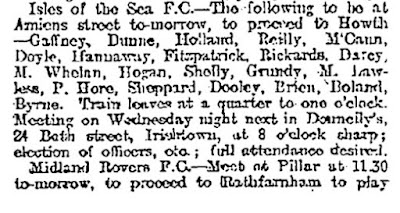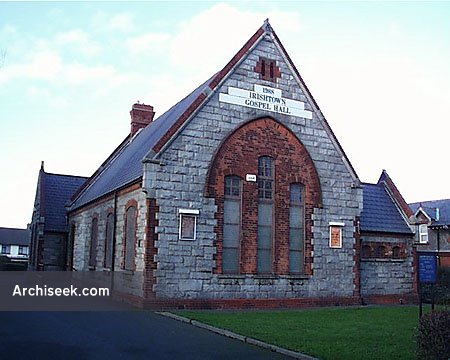No 24 Bath Street
The Isles of The Sea were one of the most successful Dublin GAA clubs in the early part of the twentieth century. Based in the Ringsend and Irishtown area The club was founded in the late 1880s in the very early years of the GAA. They won the Dublin Senior Football Championship on three occasions 1890, 1895 and 1901. Their players from the club backboned the Dublin team that won the 1901 Senior Football title, with that final played on 2 August 1903. A number of club meetings were held at No.24 Bath Street, a popular bar in the Irishtown area. A year earlier advertisements noted that meetings of the Leinster Senior League would be held at No.24 Bath Street.
Back in 1870, James Dunne was the publican at No.24 and he was followed by his widow Elizabeth and later by his sister in law Mary Dunne. Elizabeth was originally from Haddington Road, died in 1894.
The Dunne’s were followed in 1892 by James Crutch, the pub being sold in September. Liverpool born Crutch was described in the 1901 & 1911 census as a ‘Clerk’. He was married to Louth born Esther Leslie. The couple lived on Sandymount Green for many years before his death
James Crutch was followed in 1897 as licensee by Anne Jane Graham. Anne Jane Leslie was born on August 27, 1859, in Dundalk, Louth, Ireland, her father, Richard, was 24, and her mother, Esther, was 29. She married Robert Ritchie Graham on November 27, 1876 and they had nine children over a period 19 years. She had three brothers and two sisters one of whom, Esther was married to the previous licensee James Crutch. Robert was a assistant supervisor at the GPO in O’Connell Street. While the pub was located on Bath Street, the Graham family lived on nearby Londonbridge Road.
In September 1899 Patrick Hughes took over the running of the pub but was gone within a year to be replaced the following September of Mrs. Mary Bourke.
























